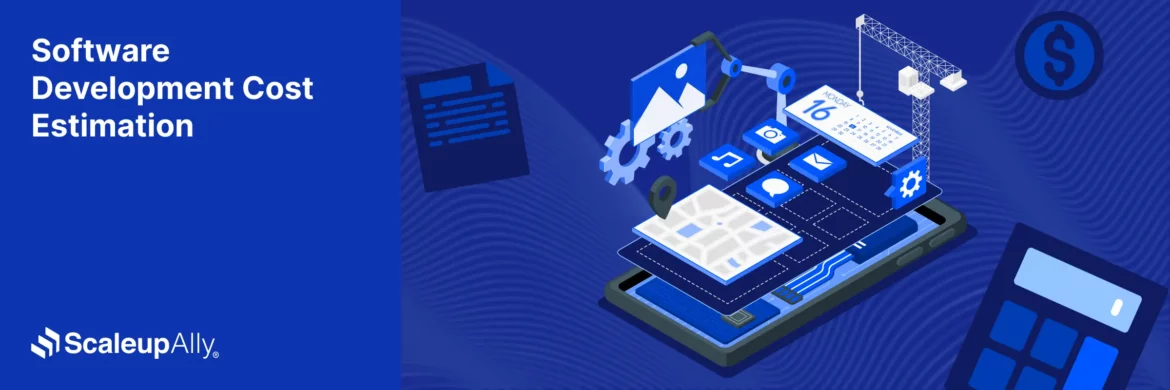
Custom Software Development for Small Businesses: A Complete Guide
Suprabhat Sen | April 29, 2025 , 15 min read
Table Of Content
For small businesses, staying competitive often means finding innovative ways to solve problems and improve efficiency. Yet, off-the-shelf software frequently falls short, forcing businesses to adapt their workflows to rigid systems.
Imagine a solution that evolves with your needs, streamlines operations, and scales effortlessly as your business grows. That’s where custom or bespoke software comes in.
Whether you’re managing customer relationships, streamlining workflows, or future-proofing your operations, custom software offers a strategic advantage that generic tools simply can’t match.
Key Takeaways
- Custom software is designed for your business needs and solves unique challenges that generic tools can’t.
- It boosts customer satisfaction, increases efficiency, and grows with your company.
- By simplifying processes and cutting down on inefficiencies, it saves money over time, even though the initial investment may appear excessive.
- Clear objectives, a trustworthy development partner, and a dedication to testing and upgrades are necessary when creating custom software.
- Despite challenges like budget constraints and technical complexity, custom software empowers small businesses with tools that drive success and adaptability.
What is Custom Software for Small Business?
- What is Custom Software for Small Business?
- When to Use Custom Software Development?
- Why Do Small Businesses Need Custom Software?
- 5 Different Types of Custom Softwares for Small Businesses
- 6 Benefits of Custom Software for Small Businesses
- How to Build Custom Software Development as a Small Business?
- Cost of Developing Custom Software for Small Businesses
- Challenges Small Businesses Faced While Building Custom Software
- How can ScaleupAlly help?
- Conclusion
- Frequently Asked Questions
For small businesses, custom software is a tool or system designed to align with how you operate and solve problems and enhance efficiency where generic, off-the-shelf software may not be capable of.
It’s creating something uniquely yours. Whatever the challenge is, custom software molds itself according to your business needs and not the other way around. Custom software empowers small businesses to scale smarter, respond faster, and build experiences that keep customers coming back.
This is particularly true for SMEs that need specialized custom software development services that can address their unique challenges and growth requirements.
Examples of Custom Software for Small Businesses
Custom software isn’t a one-size-fits-all solution—it’s tailor-made to solve your challenges. Here are a few real-world examples of how small businesses can use custom software to work smarter, serve better and grow faster:
- Inventory Management for a Bakery
Imagine a bakery that needs to track perishable ingredients like flour, eggs, and butter in real time. A custom inventory management system can do just that—automatically monitor stock levels, predict reorders, and even sync directly with suppliers. No more last-minute scrambles or stock-outs—just smooth operations and fresher pastries. - CRM for an HVAC Company
For a local HVAC business juggling dozens of customer calls, a custom CRM makes life easier. It can track service history, schedule appointments, and send friendly maintenance reminders. The result? Better customer relationships, fewer missed follow-ups, and more repeat business. - Booking Platform for a Fitness Studio
Let’s say you run a boutique fitness studio. A custom booking app allows clients to schedule sessions, make payments, and even join waitlists—all in a sleek, branded interface that mirrors your studio vibe. No clunky third-party platforms—just one seamless experience from signup to sweat. - Project Management for a Marketing Agency
Small marketing teams often drown in tasks and deadlines. A custom project management tool helps organize campaigns, assign tasks, and generate reports with a few clicks. It’s not just about saving time—it’s about reclaiming headspace so your team can focus on the creative work that matters.
When to Use Custom Software Development?
Custom software isn’t for every situation—but when it fits, it fits perfectly. Here’s when small businesses should seriously consider going custom:
- Your Workflows Are Highly Specific
If your business has unique operations—like a craft brewery tracking fermentation timelines and ingredient batches—off-the-shelf software will only get in your way. Custom tools are built around how you work, not the other way around. - You’re Wasting Time with Manual Fixes
Still copy-pasting data between apps? That’s a red flag. When your current tools don’t talk to each other and you’re stuck patching things manually, it’s time to think custom. One well-integrated system can replace all that busywork. - You Plan to Grow (and Fast)
Growth is exciting—until your tech can’t keep up. If your business is scaling and you want your tools to scale with it, custom software makes sure your systems never slow you down. - You Want to Stand Out from the Competition
Maybe you want to offer a loyalty experience no one else in your space does. Or provide a smoother, more delightful customer journey. Custom software gives you that edge—something generic tools just can’t replicate.
Whether you’re a small clinic creating patient portals or a local retailer blending POS and loyalty tracking, custom software helps you move like a giant—without the bloated cost of enterprise tools.
So, why exactly does custom software make so much sense for small businesses? Let’s break it down.
Why Do Small Businesses Need Custom Software?
Here are a few reasons why you should consider building a custom software for your small business:
1. It’s Efficient for Small Businesses
Generic software often forces businesses to adjust their processes to fit the tool. Custom software, on the other hand, does the opposite by being designed around how you work. This means less time spent figuring out how to work around certain constraints provided by generic software and more time focusing on growing your business which is all that matters.
2. It can Scale To Match Your Growth
As your business grows, so do your needs and Off-the-shelf software may struggle to keep up which may end up requiring expensive add-ons or new software altogether. Custom software evolves with you and ensures that your tools scale alongside your business ambitions.
3. It Saves Cost Over Time
Because you won’t have to pay for features you’ll never use or monthly subscriptions, custom software ultimately pays for itself, even though it may seem like a large upfront cost. Over years of use, it lowers operating costs and saves time.
4. Ability to Integrate with your Existing Tools
Most small businesses already use tools they love (it could be a payroll app or a communication platform). Custom software can integrate these tools into one cohesive system that eliminates redundancy and streamlines operations.
5. Enhanced Security and Control
Using generic software often means trusting third parties with your data, sometimes at the risk of breaches. Custom software allows for security measures that give you full control over sensitive information and peace of mind.
6. Better Customer Experience
When your systems work for you, it shows in how you serve your customers. Custom software ensures smoother interactions, faster service, and features designed to meet your customers’ needs, keeping them loyal and satisfied.
7. Automation That Frees Up Time
Repetitive tasks (like data entry, order tracking, or reporting) can bog down your team. Custom software automates these workflows and frees up time for more strategic, high-impact activities.
8. It Future-Proofs Your Business
Technology changes fast, and sticking with rigid, generic systems can leave your business behind. Custom software adapts to new trends and ensures that your business stays ahead no matter what comes next.
5 Different Types of Custom Softwares for Small Businesses
Here are the different types of custom softwares that small businesses can build:
1. Customer Relationship Management (CRM)
With a custom CRM system, you can manage customer interactions, follow-ups, and sales pipelines without the needless clutter of generic CRMs. Custom CRM systems are made especially for small businesses. It can even incorporate audience-relevant tailored features like loyalty monitoring or email advertising.
2. Project Management Tools
Generic project management software often includes features you’ll never use or lacks the functionality you need. Custom project management tools adapt to how your team operates, whether it’s organizing workflows for a creative agency or tracking deliverables for a construction firm. It’s built to help your team collaborate better.
3. E-commerce Platforms
Custom e-commerce software lets you create an experience as unique as your products. Want to add niche payment options, offer dynamic pricing, or streamline inventory updates? Custom platforms do it all while reflecting your brand’s identity and meeting your operational demands.
4. Industry-Specific Small Business Custom Software
Every industry comes with its own quirks. Whether you’re a bakery managing perishable inventory or a local gym scheduling personal training sessions, custom software for your field helps solve problems specific to your operations. It’s your industry’s secret weapon to stay ahead of competitors who rely on generic tools.
5. Enterprise Resource Planning (ERP) Software
For small firms, managing inventory, supply chains, finances, and staff schedules may be quite taxing. Everything is combined into a single system that is tailored to your needs using custom ERP software. You will have a single, effective solution that keeps your organization operating rather than utilizing several technologies.
Also Read: Custom Software Examples
6 Benefits of Custom Software for Small Businesses
Here are six reasons why investing in custom software development can be beneficial for your small business:
1. Built Around Your Needs
Off-the-shelf tools come with compromises, but custom software doesn’t. It’s developed with your business in mind and addresses the specific gaps and inefficiencies that generic solutions can’t.
2. Streamlines Operations
Imagine tools that simplify everything you do (from tracking tasks to automating repetitive work). Custom software clears the clutter and help you and your team work smarter, not harder.
3. Grows With Your Business
Every small business dreams of growth, but not every tool can keep up. Custom software evolves with you by expanding its capabilities as you take on more customers.
4. Puts Customers First
When you serve your customers better, they notice. It could be faster checkout times, easier communication, or personalized features, custom software helps you build loyalty and trust.
5. Saves Money Over Time
The sticker price of custom software may seem high at first, but over time, it saves you money. No endless subscriptions, fewer inefficiencies, and a single solution instead of using multiple tools.
6. Keeps Your Data Safe
Your business data is priceless, and custom software helps you protect it. With built-in security measures that fit your exact needs, you stay in control and guard against breaches.
How to Build Custom Software Development as a Small Business?
You can follow the below mentioned steps to build custom software for your small business:
STEP 1: Define Your Needs Clearly
Start by understanding what your business needs. What challenges do you face? Where are the gaps in your current tools? Whether it’s better customer management, automating workflows, or integrating your systems, clarity here sets the foundation.
STEP 2: Choose the Right Development Partner
Unless you have an in-house team, you’ll need a reliable developer or software development agency to hard code your ideas. Look for partners with experience in your industry and a portfolio that proves they understand small business needs.
STEP 3: Plan the Features and Design
Work closely with your developer to map out the software’s features and interface. Think about usability—your team should be able to navigate it easily without extensive training. Prioritize simplicity and functionality over flashy designs.
STEP 4: Stay Involved During Development
Don’t hand off the project and disappear. Regular check-ins, feedback sessions, and testing phases are crucial. This ensures the final product aligns with your vision and functions as intended.
STEP 5: Test, Test, and Test Again
Before launching, thoroughly test the software for bugs, security gaps, and user experience issues. Involve your team in the process. They’ll be the ones using it daily, so their input is invaluable.
STEP 6: Train Your Team
Once the software is ready, train your employees on how to use it effectively. A smooth onboarding process ensures the tool is fully embraced and used to its potential.
Cost of Developing Custom Software for Small Businesses
Custom software for small firms can range depending on features, team size, and complexity. A detailed cost estimate helps businesses understand how these factors influence their budget before development begins.
Advanced systems can cost more than $50,000, whereas simple tools or MVPs can cost between $5,000 and $20,000. Although it could be less expensive to hire agencies as compared to independent developers as agencies offer a full-service staff.
Development typically takes 3–12 months, with hourly rates of $50–$200 depending on expertise. Ongoing maintenance, cloud hosting, and third-party integrations add to costs, averaging 15–20% of initial expenses annually.
Challenges Small Businesses Faced While Building Custom Software
A few challenges small businesses might face while building custom software include:
1. Budget Issues
Every dollar counts for small businesses, and custom software can feel like a luxury. The challenge isn’t just funding development—it’s balancing this investment against marketing campaigns, equipment upgrades, or hiring needs. Stretching resources too thin risks undermining growth in other areas.
2. Translating Vision into Code
Small business owners know their challenges inside out, but turning those insights into a developer’s roadmap? That’s an entirely different story. Miscommunication often leads to software that’s functional but doesn’t truly solve the problems it was meant to address.
3. The Time Trap
Development demands more than money. It needs your attention. Between meetings with developers, testing prototypes, and providing feedback, small business owners often find themselves pulled away from running day-to-day operations.
4. Feature Overload
Building custom software sometimes spirals into trying to do everything at once. That loyalty program, inventory tracker, and chatbot? Great ideas, but cramming them all in risks creating a bloated, unfocused system that complicates rather than simplifies.
5. Post-Launch Headaches
Launching the software isn’t the end. Glitches, user resistance, and the realization that a “crucial” feature was overlooked can leave businesses scrambling for fixes—and eating into their budget even more.
How can ScaleupAlly help?
Your vision deserves more than “one software for all”. We’re not here to hand you a one-size-fits-all solution and call it a day. No, we do better than that.
We start by listening—really listening. What keeps you up at night? What is holding you back? Then we build software that solves your problems and transforms the way you work.
ScaleupAlly walks with you at every step and ensures your software evolves as your business grows. Because your success is our mission. Talk to us today and let’s build custom software for your business.
Conclusion
Custom software isn’t just an expense—it’s an investment in your business’s future. By addressing your unique needs, streamlining operations, and delivering a superior customer experience, it positions your small business for sustainable growth.
While challenges like budget constraints and development time may seem daunting, the long-term benefits far outweigh the initial hurdles. Custom software empowers your team, protects your data, and ensures your business evolves in step with the ever-changing digital landscape.
The question isn’t whether you can afford custom software, but whether you can afford to grow without it.
Frequently Asked Questions
Q: How long does it take to develop custom software for small businesses?
The timeline typically ranges from 3 to 12 months. This includes planning, development, testing, and deployment to ensure the software meets your unique needs.
Q: What is the cost of developing custom software for small businesses?
The cost of developing custom software for a small business ranges from $5,000 for simple systems to $50,000+ for advanced systems.
Q: What features should small business software include?
Essential features depend on your needs but often include automation, integration with existing tools, scalability, user-friendly interfaces, and solutions for specific challenges your business faces.
Related Blogs

Top 20 Emerging Technologies of 2026
Discover the top 20 emerging technologies of 2026. Explore which innovations are driving change across healthcare, finance, manufacturing, and other crucial industries.
ScaleupAlly Team
Dec 16 ,
9 min read

Software Development Timeline: Phases, Duration & Estimation Guide
Understand the software development timeline with phase durations, key factors, hidden delays, and practical methods to estimate project time.
Suprabhat Sen
Nov 29 ,
16 min read

Software Development Cost Estimation Guide: What’s Included & What Affects the Price
Explore software development cost components, major pricing factors, and practical estimation methods to plan your project accurately from start to finish.
Suprabhat Sen
Nov 29 ,
14 min read



